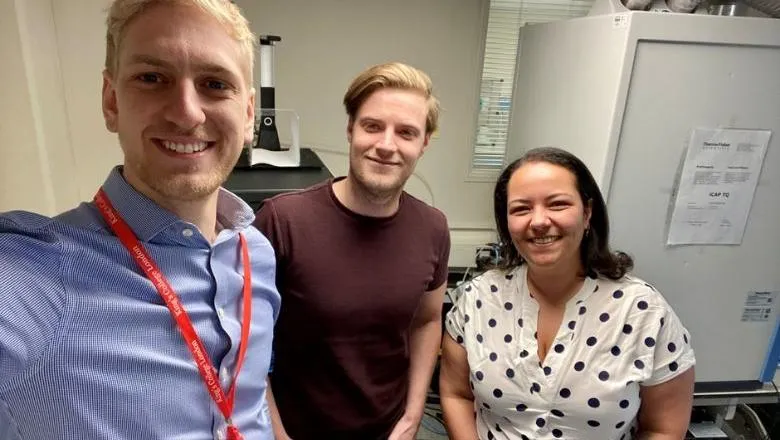26 May 2022
Meet… the new team of the London Metallomics Facility
We caught up with Dr Alex Morrell, Dr Alex Griffiths and Ms Renata Magueta

We recently caught up with the new team at the London Metallomics Facility (LMF), finding more about the work that they do, who they are and what the future holds for the facility.
What is the London Metallomics Facility?
Metals are intertwined in every aspect of our lives, yet few are aware of the magnitude and scope of how metals support the very foundation of life as we know it. Metallomics is an emerging field aiming to understand the fundamental role of metals in biological systems, from metal dyshomeostasis causing diseases such as neurodegeneration and cancer to theragnostic applications of metals in modern medicine.
Based at King’s, the LMF is currently the only centre of its kind, specifically dedicated to expanding frontiers in multidimensional analytics and correlative elemental bioimaging. With a vision to provide and coordinate the most advanced combination of techniques for elemental analysis and correlative molecular imaging in biological samples, ranging from atomic to whole body scales.
What does the LMF offer King’s?
We aim to establish direct interaction between leading research groups, commercial partners, and industry, whilst driving educational outreach and public engagement strategies. In doing so, the LMF provides a unique central resource to help understand the role of essential and non-essential metals in biology. Including their roles in disease, clinical diagnostics based on metal metabolism, therapy of disease including treatment of toxicity and manipulation of trace metal nutrient status, pharmacology and mechanisms of metallodrugs (e.g. platinum drugs), and metallodiagnostics (e.g. MR contrast agents, radiopharmaceuticals). Our team of experienced scientists work collaboratively with groups to aid in targeted and effective scientific projects, ensuring high quality sample processing, measurement, and data analysis.
Who are we?
Dr Alex Morrell currently holds a split position between managing the facility and a research position in the Faculty of Oral, Dental & Craniofacial Sciences. His main research interests are developing correlative imaging for ‘on-tissue’ imaging specifically for understanding the implication of exogenous metals exposures from deteriorating metallic implants.
Dr Alex Griffiths, Deputy Manager, has extensive experience in isotope biogeochemistry and has personal interest in heavy metal toxicity in the environment.
Renata Magueta recently joined as our mass spectrometry analyst, with significant expertise in analytical chemistry and has interest in environmental impact of operations at facilities.
What does the future hold for the LMF?
The LMF is developing new analytical workflows to underpin the ever-expanding applications of elemental analyses. These include improvements of correlative approaches to assess relationships between elemental and histological features. The LMF is also entering the realm of tagging samples with antibodies conjugated with lanthanides. This will allow multiplexed imaging of several biological epitopes whilst concurrently identifying endogenous and exogenous signals - a concept which has received significant attention in top tier journals. Using these approaches will allow for more comprehensive sample analysis, providing richer and more complete data sets, to answer complex scientific questions in all fields of research and translational applications.
How can people across King’s connect with you?
You can find out more about what we do at: https://www.kcl.ac.uk/research/metallomics
Contact us by our email LMF@kcl.ac.uk, or through our booking system ClusterMarket. We look forward to hearing about your research and working with you in the future.


